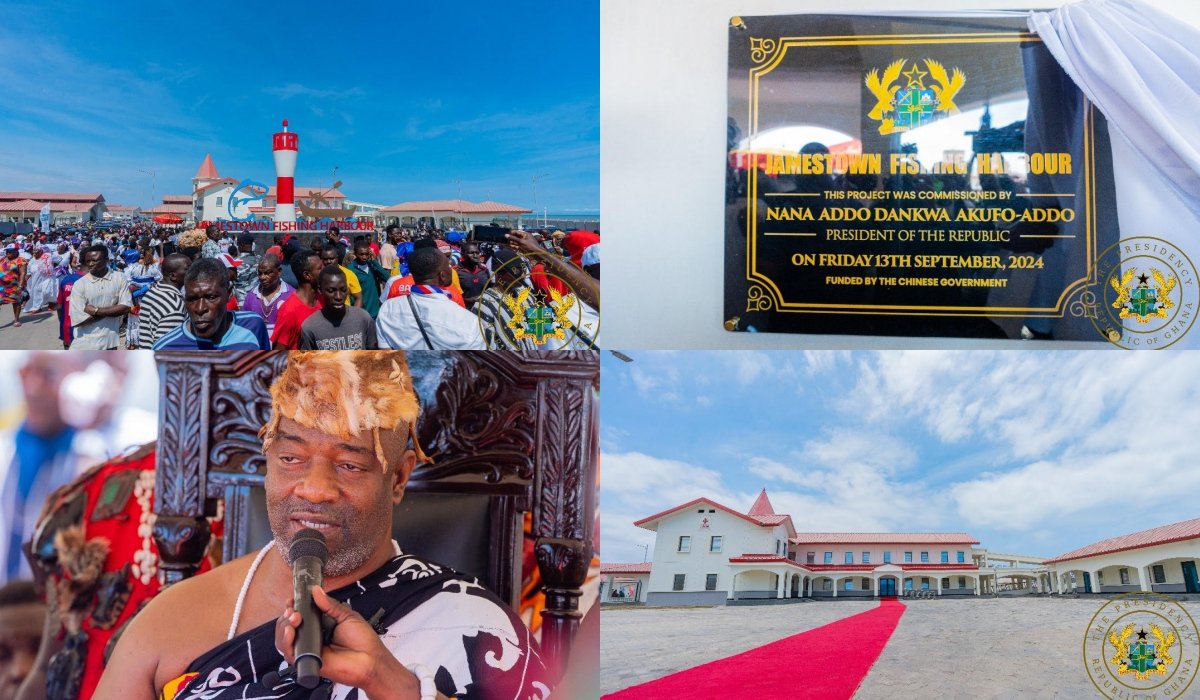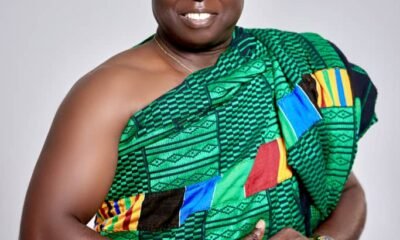News
President Akufo-Addo commissions Jamestown Fishing Harbour

In a historic moment for the coastal community of Jamestown, Accra, President Nana Addo Dankwa Akufo-Addo officially commissioned the long-awaited Jamestown Fishing Harbour on Friday, September 13, 2024.
The completion of this significant project, which has been in the making for decades, represents the fulfilment of a promise made by the Akufo-Addo government to revitalize Ghana’s fishing industry and improve the livelihoods of local fisherfolk.
The Jamestown Fishing Harbour, a state-of-the-art facility, has been eagerly anticipated since the 1960s, when discussions of constructing a modern fishing port for the area first began.
For years, these plans remained unrealized, leaving the people of Jamestown and the broader Ga community with unmet expectations.
Today, however, the harbour stands as a testament to the government’s commitment to action, with President Akufo-Addo proudly delivering on a decades-old promise.
Speaking at the commissioning ceremony, the President emphasized the symbolic and practical importance of the new facility.
“This moment is the culmination of years of effort and the realization of a long-held dream that began as far back as 1965. Promises were made, hopes were raised, but no substantial action was taken—until now. Today, we move beyond rhetoric to action,” he said.
President Akufo-Addo, who has personal ties to the Jamestown area, having grown up in the nearby Korle Wokon, expressed his deep satisfaction in bringing this project to fruition.
He recalled the day in December 2018 when he cut the sod for the project, however he was doubted on his ability to deliver the promise.
“In October 2020, I returned to inspect the progress, and today, here we stand together as witnesses to the fulfilment of that commitment,” he noted with pride.
The newly constructed fishing harbour is expected to transform the local economy, generating employment, improving the lives of fisherfolk, and boosting domestic fish production.
The President highlighted the socio-economic significance of the project, stating, “This port is a symbol of hope, proof of the resilience and determination of our people, and a concrete manifestation of what we can achieve when we work together for the common good.”
“This is not just a building; it is an investment in the future of this community. The inclusion of daycare centres demonstrates a governance of compassion, one that empowers women and strengthens families,” President Akufo-Addo remarked.
The commissioning of the Jamestown Fishing Harbour follows the successful completion of the Elmina Fishing Port in May 2023, another landmark project under the Akufo-Addo administration aimed at transforming Ghana’s fishing industry. The President underscored his government’s understanding of the critical role agriculture and fisheries play in Ghana’s economy, noting that the fishing sector supports over 2.6 million livelihoods and contributed US$263.2 million to the nation’s GDP in 2020.
“This harbour is not just a monument to progress; it is a vital lifeline for socio-economic empowerment, job creation, and improved livelihoods. We are investing in superior infrastructure to reduce post-catch losses, improve fish catches, and reduce our dependence on imported fish,” President Akufo-Addo stated.
During the construction phase of the Jamestown Fishing Harbour, some 500 direct jobs were created, with expectations for more as the facility becomes fully operational. The harbour’s completion is also expected to revitalise the entire community, sparking economic activity and growth in the region.
President Akufo-Addo extended his gratitude to the Ga Mantse, the chiefs, and the people of Jamestown for their unwavering faith in his government. He also acknowledged the support of the People’s Republic of China, particularly President Xi Jinping, for their contributions to the project.
Additionally, the President commended Ambassador Edward Boateng and former High Commissioner Isaac Osei for their instrumental roles in bringing the project to life.
The Jamestown Fishing Harbour is a landmark achievement in President Akufo-Addo’s broader agenda of infrastructural development aimed at improving Ghana’s socio-economic landscape. As the people of Jamestown celebrate the fulfilment of this long-standing promise, the harbour stands as a beacon of hope, progress, and prosperity for the future.
The harbour, which is equipped with a range of modern facilities, is designed to address some of the long-standing challenges faced by Ghana’s artisanal fishing sector.
These include the safe launching and landing of canoes, improved fish handling, and enhanced storage capacities.
Notable features of the port include a 200-capacity fish market, a 60-tonne ice-making plant, a 200-tonne cold store, and market stalls, among others. A daycare centre has also been included to support women traders, allowing them to conduct their business with peace of mind, knowing their children are safe.
News
Damango wages war on shisha smoking among minors

Troubled and anxious citizens in Damongo of the Savannah Region have expressed concerns about the number of young people, believed to be under the age of 18, involved in ‘shisha’ smoking in pubs and drinking spots within the township.
Eyewitnesses say the minors were seen patronising nightlife venues, where Shisha smoking happen in the open.
The situation has sparked renewed public concern over the enforcement of child protection laws and regulations governing the operations of entertainment centres in the municipality and country as a whole.
An eyewitness, who spoke to The Spectator on conditions of anonymity for security reasons, noted that the situation was becoming increasingly common.
“This is not a one-off incident. It is becoming very common, but residents like us cannot openly report or speak about it because our lives will be at risk,” he said.
Under Ghanaian law, minors were prohibited from patronising Shisha.
Public health experts have consistently warned that shisha use exposes users to harmful substances that can negatively affect brain development, respiratory health, and overall well-being, particularly among young people.
The residents believe the alleged incidents point to broader challenges relating to youth supervision, substance abuse, and weak enforcement of existing regulations and have called on municipal authorities, security agencies, and regulatory bodies to intensify monitoring of pubs and entertainment centres to ensure compliance with the law.
In an effort to address the menace, Mr Salisu Be-Awurbi, the Savannah Regional Minister, has led public education campaigns, engaged security agencies, and supported enforcement actions to address the rising use of illicit substances in the region.
Wura Kelly Seidu Boresah I, the Chief of Damongo, has also called on all stakeholders including parents, community leaders, institutions, and young people to actively support efforts to curb drug abuse, warning that the rising consumption of hard drugs poses a serious health threat to the future of the youth in the Savannah Region.
He also cautioned individuals involved in the sale and distribution of illicit drugs to immediately desist from the practice, stressing that offenders will face arrest and prosecution in accordance with the law.
From Geoffrey Buta, Damongo, Savannah Region
Join our WhatsApp Channel now!
https://whatsapp.com/channel/0029VbBElzjInlqHhl1aTU27
News
Ga Mantse endorses initiative to end domestic voilence

Dr Theresa Baffour, an advocate for ending violence and Chief Executive Officer (CEO) of SAHM SAHW Foundation, has said that society plays a critical and pivotal role in breaking the cycle of domestic violence.
According to her, domestic violence is a major contributor of making women, who are mostly the victims, mentally derailed and unable to engage in economic activities.
She said this when the foundation called on the Ga Mantse, Nii Tackie Teiko Tsuru II, to solicit support for the initiative by the “Strong and Healthy Minds, Strong and Healthy Women” (SAHM SAHW) to combat domestic violence within the Ga State.
The visit was occasioned by the fact that domestic violence cases have become quite prevalent in the Ga communities and is retarding growth.
According to her, the canker was an impediment to national development because the victims were usually tortured and would have to go through series of therapies to return to the right state of mind.
Dr Baffour mentioned that Gender-Based Violence (GBV) places a mental toll on women, and was, therefore, important to break the cycle through comprehensive mental health support, crisis intervention and empowerment programmes in communities with high rates of GBV.
This intervention, she underscored, would help in empowering the denigrated victim of domestic violence to soundly heal, build and thrive.
Dr Baffour added that the initiative would provide holistic, trauma-informed mental health care and advocacy for young women affected by domestic violence.
According to her, the above statement would create safe spaces for healing and equipping them with entrepreneurial skills for renewed hope and empowered life.
The Ga Mantse pledged his support for the laudable initiative to combat domestic violence and also acknowledged the need to address it in the Ga State.
Further endorsement came from Justice Julia Naa-Yarley Adjei Amoah, Chief of Staff at the Office of the Ga Mantse, as she commended the team of SAHM SAHW Foundation for taking a bold step to end the canker in the Greater Accra.
She added that it was a step in the right direction to save vulnerable women from torture, stress and emotional abuse.
By Alfred Nii Arday Ankrah












